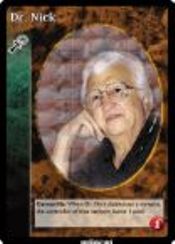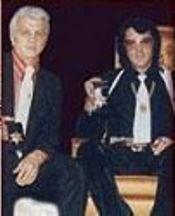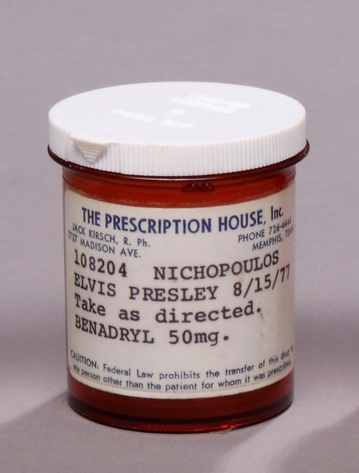Article:
Dr. Nick........
Medically Irresponsible or Misunderstood?
|
Introduction
EIN has always thought Dr. Nick receives an unfair rap!
So we thought it was time to present a range of information about him, hopefully allowing readers to, in the clear light of day, freshly reflect on each side of the story and determine a reasonable and balanced consideration of Dr. Nick's role and intentions in the complex, and often easily biased, Elvis story!
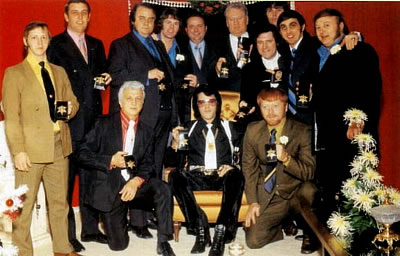
Elvis and the Memphis Mafia.......Dr. Nick (kneeling) immediately to the left of Elvis
About Dr. Nick (from Wikipedia)
George Constantine Nichopoulos (1927-) also known as "Dr. Nick" was an American doctor, of Greek descent. He is best known as Elvis Presley's personal physician, and controversial due to the singer's longstanding and ultimately fatal abuse of prescription drugs.
Born in Pittsburgh, PA, Nichopoulos moved to Anniston, AL during his infancy where his father, a Greek immigrant, opened a restaurant called "Gus' Sanitary Cafe." Dr. Nichopoulos earned his MD at Vanderbilt University Medical School in 1959, after studying at the University of the South, Birmingham-Southern College in Alabama, and the University of Alabama in Tuscaloosa. He began treating Elvis in 1967, and took it on as a full time job in 1970 until Elvis' death in 1977. In 1985, he started a solo practice called We Care, Inc. After he was stripped of his credentials in 1995, Dr. Nick worked for a short time as Jery Lee Lewis's road manager. He later took a job evaluating medical insurance claims by FedEx employees.
In 1980, he was indicted on 14 counts of overprescribing drugs to Elvis Presley and Jerry Lee Lewis, as well as twelve other patients. The district-attorney ruled out murder charges because of the conflicting medical opinions about the cause of Presley's death. In 1977 alone, Nichopoulos had prescribed over 10,000 doses of amphetamines, barbiturates, narcotics, tranquilizers, sleeping pills, laxatives, and hormones for Presley.
Dr. Nichopoulos claimed he had tried in vain to reduce Elvis' dependency, even going so far as to manufacture one thousand placebos for Elvis, but to no avail. The jury concluded that he had tried to act in the best interests of his patients. He was acquitted on all counts. Also in 1980, the Tennessee Board of Medical Examiners found him guilty of overprescription, but decided that he was not unethical. They imposed three months' suspension of his licence and three years' probation.
In 1995 Nichopoulos had his license permanently suspended by the Tennessee Board of Medical Examiners, after it was revealed that he had been overprescribing to numerous patients for years. Dr. Nichopoulos claimed it was for patients that suffered from inoperable chronic pain, but he was unsuccessful in his defense. During his many appeals, Dr Nick admitted to the board that he had overprescribed. 'I cared too much,' he told them. During his court cases many friends supported him, raising money and holding benefits to pay for court costs.
Those who know Dr. Nick say.....
With his long awaited memoir, The True Story of Elvis Presley and Dr. Nick, due for release in the next 6 to 12 months, it is interesting to read what ‘ghost writer’ Joe Russo had to say about Dr. Nick when interviewed by Andrew Hearn (Essential Elvis magazine #54 – Sep/Oct 2007):
AH: When did you first meet Dr. Nick, and what were your first impressions of him?
JR: I first met him when we started research this year. My impression is that he is certainly one of the warmest, most genuine and caring people I have ever met. His problem has been he does not ’interview’ well on camera. Geraldo Rivera managed to create the most unflattering image of Dr. Nick possible, and it has just stuck in the public’s mind through all these years.
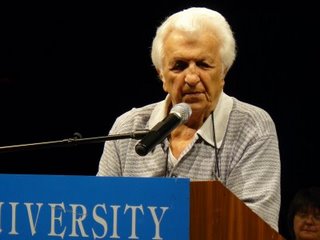
AH: What’s your impression of the Nichopoulos family and their story?
JR: From what I see, if the media had actually taken some time to learn what makes that man tick, they would not have been so quick to judge him.based on the story that has been told up to now, that obviously never happened.
AH: And how do you think it’ll [Dr Nick’s book] will be received by the fans, particularly those still against Dr. Nick?
JR: If you are willing to read it with an open mind, then I’m confident you’ll come away with a much expanded outlook and understanding of what was actually going on at the time.
................................................................................
Nurse Marian Cocke stated in her book, I Called Him Babe: Elvis Presley's Nurse Remembers:
.......all of Presley's medications to treat his hypertension, colon problem, high blood pressure and fluid retention were carefully monitored by Dr. Nick, herself and the other nurses who cared for him.........There was never a time that she noted any sort of medication abuse or misuse.
................................................................................
Similarly, a person who wishes to remain anonymous, but who knew Dr. Nick quite well, has told EIN:
"Dr. Nick is basically a good man, his problem is he got into a lifestyle entering Elvis' life as more than his doctor when he should have just remained his doctor.
He got roped in by Elvis giving him stuff and getting him to travel on tours etc. and he got in over his head. Elvis did it so he could get what he wanted prescription wise but it got out of hand in the later years. Nick also got attached to Joe too much and they both used each other to influence Elvis.
As far as doctors were concerned Nick became the lesser of all evils. Elvis cultivated other doctors in L.A, Vegas and Palm Springs who were manipulated by Elvis. To a point Nick became concerned in the later years and tried to control the pills as best he could."
What those close to Elvis say about Dr. Nick:
Ed Bonja.
EIN - In your opinion was he a good or bad influence for Elvis?
Ed Bonja – Well actually I liked Dr Nick and used to get along with him. Dr. Ghanem was also my doctor in Vegas. He told me how he would dump stuff out of capsules and put in placebos too. He knew that a lot of other stuff was being prescribed by different Doctors but he said he had nothing to fear as he tried his best for Elvis and tried to help him get off anything that he shouldn’t have been on.
People still tell stories about all of Elvis’ doctors but it is hard to know the truth.
You can’t help a man who won’t help himself. With Elvis’ power he had to get his way - which made it a hundred times worse.
Go here for full Ed Bonja Interview
http://www.elvisinfonet.com/interview_bonja2.html
Larry Geller.
EIN - In March 77 you did go on that last vacation to Hawaii. Obviously Elvis at the time was really floating between vitamins & health regimes that you were suggesting and Dr Nick and all his chemicals.
Larry Geller - I have no respect for Dr Nick. Before a tour would start I would have packets of vitamins and minerals all wrapped up for the tour to help keep me healthy. Plus I was a vegetarian. One day I was in Elvis' bedroom when he woke up and Dr. Nick was there. I took a packet of vitamins out and put it on the table and said, "Elvis you should take some of these man, they are so good for you." I also gave a little spiel to him about their benefits. Dr Nick says, "Hey, get that crap out of here. That shit doesn't work." Here was a medical Doctor saying this! Of course he is not anymore. Thank God for some justice.
EIN - In fact wasn't 1967 when you first left Elvis the same moment that Dr Nick arrived?
Larry Geller - Yeah, and Elvis started his regime of pills at that time.
Go here for full Larry Geller Interview
http://www.elvisinfonet.com/gellerpart2.html
Myrna Smith of the Sweet Inspirations.
EIN - It does seem that The Colonel became a sad man at the end but I don't feel particularly sorry for him when I read what he did to some people. And there is that feeling that neither he, nor Dr. Nick, were any good for Elvis at all in his later career?
Myrna Smith - I actually can't agree with you about Dr. Nick because I happen to think that Dr. Nick did much more good than people know. I think he has been unfairly accused and blamed. Elvis had his own mind and was very stubborn in that respect. Elvis did what Elvis wanted to do and Dr. Nick tried his best by giving him placebos and did all that he could. Elvis was the type of person that could convince you to do what he wanted you to do.
So Dr. Nick got caught up in that, as well as all the other doctors. Some have never even been accused of the harm that they caused. Dr. Nick was not the worst. Someone like 'Dr. Flash' never even gets mentioned. We never even knew his name, but he just came in before the show, gave Elvis a shot and was out of there in a flash! He was bad & he did a lot of harm.
Go here for full Myrna Smith Interview
http://www.elvisinfonet.com/myrna.html
Marty Lacker.
EIN: What are your views on Dr Nick's role in Elvis' decline and dependency on prescription medications?
Marty Lacker: Dr. Nick truly cared about Elvis but he got caught up in a lifestyle that he shouldn't have and it made him do things he shouldn't. He's a good man and people have been too harsh on him.
EIN: What about the other Doctors like Dr Ghanem & Dr Flash? Were they all bad news?
Marty Lacker: In my opinion, yes.
Go here for full Mary Lacker Interview
http://www.elvisinfonet.com/interview_martylacker_2005.html
Billy Smith:
The True Story of Elvis Presley and Dr. Nick
For ten years Dr. George Nichopoulos, better known as "Dr. Nick", was one of Elvis's most trusted and valued advisors and personal physician. He and his son, Dean, who started first as his racquetball teacher and then as his trusted valet, were there to help maintain balance amid the craziness Presley's lifestyle demanded, and his fans have yet to fully understand.
At the end, they were there to observe a proud, private Elvis trying desperately to cope with his career pressures, personal problems and failing health.
Now Dr. Nick and Dean are collaborating with Elvis historian, Joe Russo on the book that Elvis's legacy deserves. |
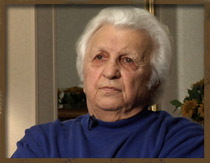 |
It's a story filled with honesty and compassion that only they can tell. Put aside what you've heard before about Elvis's final days and get ready to understand for the first time, the inner workings of the man who was, and still is, the king of rock n' roll.
Do you have any unresolved questions about Elvis's health, lifestyle or prescription drug dependency? Or about Dr. Nick's efforts to manage his illness and pain while Elvis strived to stay at the top of his game? Have you wondered what medical technology and experts could reveal today about Elvis's medical condition and the cause of his death?
Please visit our CONTACT page, submit your questions, and participate in this ground-breaking story, destined to become one of the most important books about Elvis Presley. Become a part of unveiling the truth about Elvis Presley, his life, death and the impact he continues to have in the world today.
The Authors
Dr. George Nichopoulos - Personal physician to Elvis Presley. He was Presley's confessor, confidant and life support system. He was "on call" to sooth Presley's concerns, phobias, and ailments. Presley looked upon Dr. Nick as a pseudo father-figure, and entrusted thoughts and personal details he shared with few others. Dr. Nick was there, on tour, at home and "behind closed doors".
Dean Nichopoulos - Presley's personal valet for the last several years of his life. Presley referred to Dean as "the son I never had". He virtually "lived" at Graceland and was there to serve and assist Presley in his daily routine and on concert tours. Dean looked after all Presley's personal needs and was always present for motorcycle rides, racquetball games or whenever Presley decided to just have some fun. Joe Russo - Elvis historian and author of four books including ELVIS STRAIGHT UP with Joe Esposito. He also has been a performer himself for over seventeen years. Due to this duel persona, he is often referred to as the "rock n' roll writer".
(for more information, please visit www.joerusso.com)
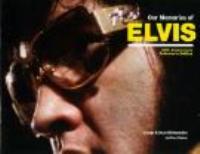
Pre memoir, photobook - 'Our Memories of Elvis' - released by Dr. Nick, his son Dean and Joe Russo
The following article first appeared in The Observer newspaper and was later published by EIN in 2004 (fan club newsletter) and more recently by the Irish Elvis Fan Club:
Sunday August 11, 2002
The Observer
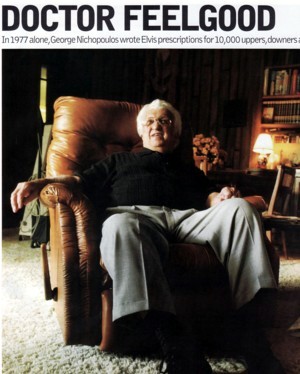
The old man stands outside his house in the gathering dusk. A hot summer wind blows the smell of cut grass across the street. Opposite, a woman rides a mower up and down her vast front lawn.
'One of my patients, who was dying from Aids,' he says, 'his parents bought him this house next door so he could be close to me - 10, 20 years ago.
'Those people,' he points across the road to an impressive colonial-style property, 'used to be my patients. They built this house.'
Behind him, ochre paint blisters and peels from the walls of his home: the house that Elvis helped him buy; the one they designed together. He wants to sell it now. It's too big: he and his wife don't need seven bathrooms. He hasn't used the racquetball court in a year. The shag-pile carpet has seen better days.
We stare in silence at the woman on her mower.
Who treats all these people now?
He glances sideways at me over his glasses with a wry twinkle. 'Mostly,' says Dr Nick, 'they go to veterinarians.'
It's just gone seven years now, since they finally took his licence away from him. But everyone still calls George Nichopoulos 'Dr Nick'. People have been calling him that since he qualified at Vanderbilt Medical School in 1959. And nobody seems ready to stop - even now, since that last run-in with the Tennessee Medical Board, that he's not a real doctor any more. 'Defrocked,' he says. 'My wife still calls me George.' Twinkle. 'When she talks to me.'
Dr Nick doesn't really care for interviews any more. What with one thing and another, he doesn't feel he's been very well served by the media. On the phone he sounds hesitant, nervous, as if afraid of saying anything at all. But he agrees to meet, to discuss the possibility of talking further. I ask how I will recognise him. 'Oh,' he says, 'I'm just a short, grey-haired, fat man.'
In fact, his hair is white, as it has been since he was in his thirties: it's a Dr Nick trademark. He comes to meet me in the lobby of my hotel. It takes a long time to persuade him to be interviewed. He doesn't want his friends and family hurt any more than they already have been. 'I'd like to set the record straight,' he says, 'But I don't know...' He speaks slowly, in a gentle southern accent, and leaves long pauses, wetting his lips, chewing over his thoughts before delivering them. There are a lot of things he says he just can't remember.
Doctor George C Nichopoulos was, for a while, one of the most infamous physicians in the world.
For 10 years Dr Nick was Elvis Presley's personal doctor. It was Dr Nick who helped prescribe the constellation of uppers, downers, laxatives, narcotics, hormones and shots that kept Elvis going through the last decade of his life.
But it wasn't until 1977, when details of the King's titanic appetite for prescription drugs began leaking out, that anyone outside Memphis knew his name. Then, in the wake of Elvis's death, ques tions began to be asked of him. The cause of death was officially recorded as 'fatal heart arrhythmia'- a heart attack. But blood tests conducted at the BioScience laboratory in Van Nuys, California showed traces of 14 different drugs in Elvis's body at the time of his death. It didn't take the media long to decide that the Memphis medical examiner's officially recorded conclusions were part of a cover-up. Elvis did not die of natural causes, they argued. He died of an overdose of drugs. Drugs that Dr Nick gave him. Fans around the world were convinced that they had found the Man Who Killed Elvis.
In 1967, when Dr Nick first started treating Elvis Presley, he was a well-respected member of a Memphis group practice. He and six other doctors specialising in internal medicine had a good referral practice, seeing patients from all over the area. This year, 25 years after the sudden and unexpected death of his most famous patient, Dr Nick still works in Memphis - in the disability benefits department of the city's biggest employer, Federal Express. He examines the medical insurance claims of FedEx employees injured while working for the company. That way, he's still able to use his medical knowledge. But it's just paperwork.
'There's no hands-on medicine. I don't see any of these people. I read their records.'
But Dr Nick has to keep working. He has legal bills to pay. In and out of courts and medical tribunals for many of those 25 years, he's borrowed heavily, spent his pension fund and, in the end, lost his job anyway. He doesn't know how much longer he's going to have to work to pay off his debts.
'I've started to write a book several times, and I just can't get motivated,' he says. 'I just wanted to put all this behind me and go on with my life.'
It may be a little late for that now. Dr Nick will be 75 in October.
To begin with, Dr Nick treated Elvis for insomnia. But by 1967, this was no simple task. Elvis had a history of disrupted sleep, sleepwalking and nightmares going back to childhood. It intensified after the death of his mother, and his drafting into the army in 1957. And in his early twenties, Elvis had also developed an evangelical enthusiasm for amphetamines. Legally available in the US as appetite suppressants - they weren't outlawed until 1965 - they kept him going and they kept his weight down. They also, of course, kept him awake. He had become what Dr Nick calls a 'night person'.
By the time he became Dr Nick's patient, Elvis was a dedicated student of the Physician's Desk Reference , the doctor's encyclopedia of contemporary pharmacology. He was taking an exotic cocktail of uppers and downers: Tiunal, Desbutal, Escatrol. The powerful tranquilliser Placidyl would become a particular favourite. And he was going to increasing lengths to get hold of them - sending 'the guys' off to Vegas on prescription shopping trips.
At first, Dr Nick treated Elvis only on the odd occasions when he came back to Memphis from his house in LA. 'He was still in the movies. I didn't really become his primary doctor until he moved back here. Around '70.'
But in 1969, Elvis began the first of his month-long residencies, giving explosive live performances at the International Hotel in Las Vegas. Dr Nick went with him. For Elvis, Vegas - and the national touring that followed - would become a treadmill as financially profitable as it was physically costly. It would carry him on to the end of his life. For Dr Nick, it would lay the groundwork for the end of his career.
Throughout his time with Elvis, Dr Nick continued to work at the Memphis group practice. When Elvis summoned him to Graceland in the middle of the night, often simply because he was lonely and wanted someone to talk to, Dr Nick still went to his surgery in the morning. When Elvis opened in Vegas, Dr Nick flew out for the first couple of days, and then returned to Memphis.
This arrangement did not work well. Elvis's reliance upon a regime of drugs to get him going when he awoke and bring him down at bedtime was intensified by the concert schedule. Now, he needed amphetamines before a show, and then tranquillisers afterwards: and there were two shows every night. When he was around, Dr Nick tried to manage Elvis's intake. But when Dr Nick wasn't around, there was a roll-call of other doctors only too happy to fulfil the King's requirements. Doctors like Elias Ghanem and Thomas 'Flash' Newman - named for his ability to materialise at a moment's notice bearing anything you might desire. And after Priscilla left him in 1971, Elvis's behaviour became increasingly erratic. He spent more and more time in a chemical fog, taking whatever he could get his hands on.
In 1973, he overdosed twice on barbiturates: in February, when he spent three days in a coma in his suite at the Hilton, and later, on tour in St Louis. He began cancelling shows more and more frequently. At the end of the year he was admitted, semi-comatose, to the Baptist Hospital in Memphis. This time, he had been secretly seeing a doctor in LA. He had become poisoned by cortisone injections and was addicted to the high-test opiate painkiller Demerol. Dr Nick put him on meth-adone. Then he began trying to stop the flow of contraband pills from other doctors.
'Elvis's problem,' Dr Nick has said, 'was that he didn't see the wrong in it. He felt that by getting it from a doctor, he wasn't the common everyday junkie getting something off the street. He was a person who thought that as far as medications and drugs went, there was something for everything.'
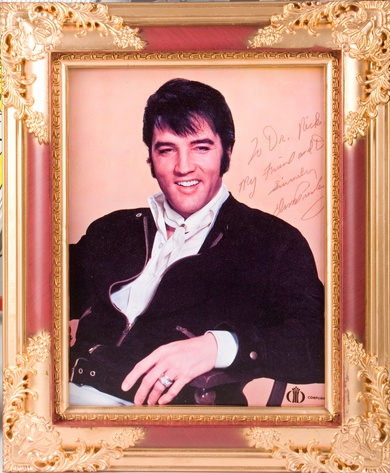
"Suspicious Minds" photo inscribed to Dr. Nick by Elvis
While he was in hospital, Dr Nick and Elvis's road manager, Joe Esposito, raided Elvis's bedroom at Graceland: they found three giant pharmacy-sized jars, each containing 1,000 high-dose Seconal, Dexedrine and Placidyl. There were even vials of pills hidden in the seams of the curtains.
Afterwards, whenever Elvis went to see a dentist or another doctor for any reason, Dr Nick went with him, 'because he would always talk these guys into anything- crazy things'.
When Dr Nick refused to give him what he wanted, he'd just find another doctor. 'He'd get mad at me, and he'd get on his plane and fly to Vegas or Palm Springs or California and stay for a few days and get what he wanted. And I'd have to take it away from him when he got back home.'
This petulant hunger for drugs was such that, when Dr Nick thought Elvis was claiming symptoms he didn't have, he began to administer placebos.
'On the road,' he says, 'he was so afraid that he wouldn't get enough sleep to do a good show the next night that he would end up asking you for an extra pill or two. So those extra pill or twos would be placebos.'
Dr Nick and the guys would while away their spare hours on tour by making counterfeit pills for the King. 'We'd sit around,' he says, 'and, instead of playing cards, we'd make placebos. Ha!' Using syringes, they'd suck the liquid out of capsules and refill them with saline solution. When Elvis asked for a shot that he didn't need, Dr Nick would wait until his back was turned, squirt the liquid on the floor, and then 'inject' his patient with the emptied syringe. Tablets were trickier. Eventually, Dr Nick managed to persuade Knoll, the manufacturers of Dilaudid, Elvis's favourite painkiller, to press a special batch of a thousand pills without any active ingredients. It took a year of letter-writing and legal wrangling. But they looked just like the real thing. They cost him $5.98 apiece.
After a series of embarrassing on-stage disasters and show cancellations when other doctors tried their methods on Elvis, Dr Nick became the regular tour physician. Licensed only to prescribe drugs in Tennessee, he would stock up on 'supplies' before leaving the state. After the first couple of times out, he got to know what he would need in advance. He began each tour with three locked suitcases filled with prescription drugs.
'My job,' he says, 'was taking care of the whole entourage. There were about 150 people I took care of. You had a couple of bands. You had the songbirds. You had the people that set up the stage... And all these people were night people, too.'
Dr Nick made sure the drugs for Elvis were strictly controlled. On tour, Elvis would come to him at regular intervals: on waking; before the show; after the show; and at bedtime. Each time, he would be allowed specific uppers and downers in the lowest doses Dr Nick thought he could get away with. At home, without the excuse that he needed amphetamines to perform, Elvis was given just the manila envelopes of sleeping tablets - 'bedtime packet number one' and 'bedtime packet number two'- to be handed out separately during the night. During the 10 years he treated him, Dr Nick never knew Presley to sleep for longer than three hours at a stretch without waking up, looking for more pills.
Surrounded by watchful retainers; impossible to trust around a medicine cabinet; incapable of making decisions for himself: it's very easy to get the impression that Elvis was a stupid man.
'No, he was a very smart guy,' says Dr Nick. 'Not to have any college education... He was well read. Ha! He carried more books on the road than we carried drugs. I mean, he had three suitcases - three big steamer trunks, full of books. Religious books, metaphysical books, some medical stuff.'
Did he understand what he was doing to himself?
'No, I don't think he did.'
Do you think you were afraid of telling him what he needed to do?
'It's hard to convince somebody what's right and wrong or what they need to do. It's hard when you've got somebody that thinks they have all the answers and no matter what you throw at 'em, they've got answers for you.'
But why didn't he just trust you as a doctor?
'Well, I think he did. I think that's the reason I was around as long as I was.'
But he still ignored you when you said, 'Look, stop taking these pills.' Which presumably you did.
'Yeah. I mean, he was always childlike with these things. I don't think he ever realised how harmful these things could be to him. If he got a sore throat, and I gave him a penicillin tablet - I gave him 20 to take, saying, "You take four a day of these things until you use these up," - so he's going to take eight or 12 a day until he uses them up 'cos he thinks he'll get well faster that way.'
But that's the behaviour of a stupid man.
'I know. It was certainly a stupid decision on his part. But he wasn't a stupid man. He was really a smart guy. But he did a lot of stupid-assed things.'
Elvis Presley died on 16 August, 1977. At the time of his death, he was suffering from glaucoma, high blood pressure, liver damage and an enlarged colon. All of these ailments were aggravated, if not caused, by drug abuse. 'He didn't have any major heart problems,' says Dr Nick. 'Even with his obesity and everything - that's what really surprised me. I was dumbfounded that he died.'
Over the subsequent months, Dr Nick began receiving death threats. On 17 September, he went to the Saturday-night football game at the Liberty Bowl Stadium in Memphis with fellow doctor Tom Langford. Langford, sitting directly behind his friend, was hit in the shoulder by a bullet. No one in the stadium heard the shot. The police told him it was an accident: a stray bullet fired outside the stadium. But some officers were sent to his house anyway. They stayed there for three weeks. Today, Dr Nick is still convinced someone meant to kill him.
The recriminations and arguments over Elvis's death and autopsy that would rumble on for another 20 years began immediately. In the summer of 1979, a production team from sensational investigative TV show 20/20 moved down to Memphis. In September, the Tennessee Medical Board charged Dr Nick with gross malpractice over the illegal prescription of painkillers and other drugs to Elvis, Jerry Lee Lewis and 12 other patients. The following day, the district attorney's office announced they were looking into whether Dr Nick could be held criminally responsible for Elvis's death. They said that they ruled out murder charges because of the conflicting medical opinions about the cause of death.
That night, an hour-long 20/20 special, 'The Elvis Cover-Up', was broadcast, maintaining that Presley was killed by an overdose of prescription drugs.
The Medical Board Tribunal heard evidence of astounding volumes of prescriptions written by Dr Nick. Between 1975 and 1977, he had prescribed 19,000 doses of drugs. In the first eight months of 1977 alone, he had written 199 prescriptions totalling more than 10,000 doses of sedatives, amphetamines and narcotics: all in Elvis's name. On 20 January 1980, the board found him guilty of overprescription, but decided that he was not unethical. They gave him three months' suspension of his licence and three years' probation.
Four months later, he faced criminal prosecution on similar charges. On 16 May 1980, still in his white coat, Dr Nick surrendered himself to the Shelby County Sheriff, who formally arrested and charged him with 14 counts of abusing his licence to prescribe controlled drugs. Dr Nick faced from two to 10 years in prison and a fine of up to $20,000 for each count. Friends formed a defence fund and raised $150,000 for him.
The trial began in October, and for a month it was a national sensation, The Criminal Justice Center in Memphis filled with reporters and TV crews, all eager to know whether Elvis died of an overdose of drugs that Dr Nick had prescribed. In November, the jury concluded that he had tried to act in the best interests of his patients. He was acquitted on all counts. 'I think he deserved this,' his attorney said. 'He's been harassed for years.'
Dr Nick went back to his practice, his patient list unaffected by the trial. 'My patients,' he grins thinly, 'the ones I didn't kill, were very faithful.'
In 1985, he started a solo practice. He called it We Care, Inc.
Then, in 1992, a tougher, more aggressive Tennessee Medical Board once again charged him with overprescription. Things had moved on. He no longer had the support of a powerful group of city doctors, whose testimony would be respected. Dr Nick argued that he was attempting to help patients who suffered from inoperable chronic pain. His supporters took out an ad in the Memphis Commercial Appeal , calling for 'friends of Dr Nick' to protest against the charges. The Health Department received an unprecedented number of phone calls decrying their 'harassment'. One caller in particular stuck in the department spokeswoman's mind: 'He never came right out and said it was Elvis,' she said. 'But he sounded like Elvis, and he just said, "You know who this is."'
The case dragged on for three years. But it was no good. In July 1995, he was stripped of his licence.
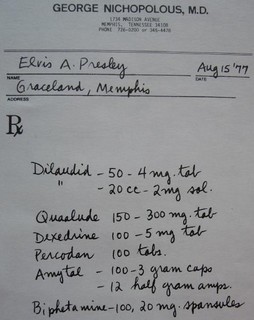
Over the next few years, he appealed repeatedly. He received counselling under the Tennessee Medical Foundation's Physician Health Program. 'One of his problems,' said the doctor who ran the programme, 'was that he couldn't say no.'
At one hearing, Dr Nick admitted to the board that he had overprescribed. 'I cared too much,' he told them. They still voted 10 to one against reinstating him. Once again, his patients organised fundraising events to contribute toward his legal fees. In December 1996, a benefit was organised for Dr Nick's campaign. It was to be headlined by his other infamous former patient, Jerry Lee Lewis. But, on the night, Jerry Lee never showed up.
In the years since he lost his licence, Dr Nick has tried to keep himself occupied. Two years ago, he and his friend Bobby organised a touring memorabilia exhibition, 'Memories of Elvis'. It started at the Hollywood Casino over in Mississippi. The centrepiece was his old black bag, complete with an empty phial of Dilaudid with Elvis's name on it.
The tour got as far as two casinos in Nevada and then stopped. Dr Nick wasn't really surprised when the bag offended people. It was Bobby's idea. 'I just did it because the guy thought it would be a big drawing card, and a conversation piece, which it was. But I didn't really want it in.'
And, bizarrely, for a while, Dr Nick also worked as Jerry Lee Lewis's road manager. 'I did that right after I lost my licence,' he says. 'Tryin' to find something to do until I could get my licence back.'
Are you still working on that?
'Not really,' he says softly.
In 1994, the autopsy into the death of Elvis was re-opened. 'There is nothing,' said coroner Dr Joseph Davis, 'in any of the data that supports a death from drugs. In fact, everything points to a sudden, violent heart attack.' A few years ago, Dr Nick re-examined a selection of x-rays taken of Elvis at the Baptist Hospital during the 70s. Now, he thinks, Elvis must really have been feeling a lot of the pain they thought at the time was a junkie stunt: he may have been suffering from degenerative arthritis.
In the end, the Tennessee Medical Board stated that they rescinded Dr Nichopoulos's licence after finding him guilty of unethical conduct, gross malpractice, prescribing drugs without a legitimate purpose and prescribing them to addicted patients without trying to cure them.
When I ask Dr Nick why he thinks they took his licence away, he is quiet for a long time. 'I think,' he says eventually, 'it's because Elvis died.'
Recent news item about Dr. Nick:
Dr. Nick's Elvis items going under the hammer: Numerous pieces of Elvis Presley memorabilia--including prescription bottles, jewelry, guns, clothes and furniture--will be among the items available at Julien's Auctions Summer Sale, to be held June 26-27 at Planet Hollywood Resort and Casino in Las Vegas, according to a press release.
Many of the items come directly from the collection of George C. "Dr. Nick" Nichopoulos, the doctor that was charged with over-prescribing controlled substances to Presley during the months leading up to the entertainer's 1977 death.
|
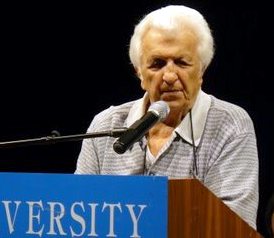 |
Nichopoulos, who was acquitted but later had his license suspended on the same charges, has consigned more than 45 items, including several prescription bottles with an estimated value of $800 - $1,200 each, his medical bag valued at $4,000-$6,000, a red strobe light Presley gave him for quick access to Graceland, a nasal douche and a laryngeal scope.
Several security items Presley gifted to Dr. Nick also will be featured in the auction, including numerous pistols, a billy club, a "Special Deputy Sheriff Shelby County" badge issued to the doctor, and a blue strobe light for his car that the doctor used on the night Elvis died.
All of the Dr. Nick items will be accompanied by Dr. Nick's Memories of Elvis DVD that explains the history and events surrounding the gifts in the doctor's own words.
The auction also will feature several items that once belonged to the Jackson Five, Frank Sinatra, Marilyn Monroe, Liberace and Karen Carpenter, among many others.
A complete list of items, including photos and estimated values, can be found at the Julien's Auctions website. (News, Source: Live Daily, late May 2009)
Links:
Visit Dr. Nick’s official website
Visit Andrew Hearn’s 'Essential Elvis' website
DVD Review: 'The Death of Elvis: What Really Happened'
Elvis and Drugs - one view
|
|








